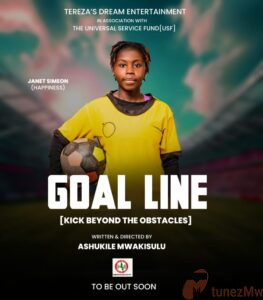In a country where football has long been considered a male preserve, a new Malawian television series is set to challenge that narrative and spark important conversations. GoalLine: Kick Beyond the Obstacles, directed by renowned actor and filmmaker Ashukile Mwakisulu, is poised to hit screens by the end of August, offering an inspiring yet hard-hitting story about resilience, identity, and the fight for dreams against all odds. The six-part series follows 15-year-old Happiness Mazola, a young girl uprooted from her home after her mother’s death, who finds herself navigating a hostile new environment where societal expectations threaten to silence her passion for football.
Tackling themes of gender bias, harassment, poverty, and self-discovery, GoalLine mirrors the lived realities of many girls whose ambitions are curtailed by traditional norms. Loosely inspired by the journeys of celebrated Malawian football icons Tabitha and Temwa Chawinga, the series dares to reimagine a world where girls can excel in fields deemed ‘off-limits.’ It also boasts the on-screen presence of former Malawian football star Robin Ngalande, who brings authenticity to his role as Coach Robert. Backed by the Universal Service Fund (USF) under the Malawi Communications Regulatory Authority (MACRA), the production represents a significant milestone in the push for more homegrown stories that reflect Malawian realities.
As the series heads for release, anticipation is mounting—not only for the drama on the pitch, but also for the powerful messages it carries off the field. In this exclusive interview, Ashukile Mwakisulu opens up about the inspiration behind GoalLine, the challenges of bringing such a socially charged story to life, and his hopes for how the series will empower young Malawian girls. From behind-the-scenes production hurdles to the broader vision for Malawi’s film industry, Mwakisulu offers an unfiltered look at the making of a series that is as bold in its storytelling as it is in its social mission.
What inspired you to create GoalLine, and why did you choose football as the central theme to explore gender issues?
Firstly, I have always wanted my productions to be issue based, mainly targeting the youth since that is the demographics that constitutes the highest number in our population. As such, I thought of highlighting a number of issues through sports and football just happened to be the one making headlines because of the Chawinga sisters’ exploits. It seems an ideal platform at this point in time as I believe it will generate a lot of interest.
The story follows Happiness Mazola, a young girl facing numerous obstacles. How does her journey reflect the real challenges faced by girls in Malawi today?
Well, the story of Happiness is not unique when it comes to issues to do with the girl-child in Malawian communities. There are a lot of stereotypes that girls in rural communities face when it comes to pursuing their dreams. They are usually discouraged and sidelined. I believe given the chance, a lot of young girls can go far in life. So, this story is set to inspire girls from disadvantaged backgrounds to follow their dreams in the face of adversity.
You mentioned the series is loosely inspired by Malawian football stars like Tabitha and Temwa Chawinga. How did their stories influence the narrative and character development?
I have always been fascinated by the story of Tabitha and Temwa Chawinga. These are two young women from disadvantaged backgrounds who faced significant challenges in their quest for success. Through hardwork and sheer determination they have managed to reach places they never imagined. Therefore, we thought of using the same tool to inspire more young women.
How did you approach portraying sensitive topics such as harassment, emotional trauma, and societal pressure within the storyline?
It was not easy since Malawi is a highly conservative society. We had to be truthful and yet cautious in our approach so that we address these issues as realistically as possible.
What message do you hope young girls and the wider community will take away from GoalLine?
The message is simple yet profound: follow your dreams regardless of any obstacles that may come your way. This is the take home message.

In a country where football has long been considered a male preserve, a new Malawian television series is set to challenge that narrative and spark important conversations. GoalLine: Kick Beyond the Obstacles, directed by renowned actor and filmmaker Ashukile Mwakisulu, is poised to hit screens by the end of August, offering an inspiring yet hard-hitting story about resilience, identity, and the fight for dreams against all odds. The six-part series follows 15-year-old Happiness Mazola, a young girl uprooted from her home after her mother’s death, who finds herself navigating a hostile new environment where societal expectations threaten to silence her passion for football.
Tackling themes of gender bias, harassment, poverty, and self-discovery, GoalLine mirrors the lived realities of many girls whose ambitions are curtailed by traditional norms. Loosely inspired by the journeys of celebrated Malawian football icons Tabitha and Temwa Chawinga, the series dares to reimagine a world where girls can excel in fields deemed ‘off-limits.’ It also boasts the on-screen presence of former Malawian football star Robin Ngalande, who brings authenticity to his role as Coach Robert. Backed by the Universal Service Fund (USF) under the Malawi Communications Regulatory Authority (MACRA), the production represents a significant milestone in the push for more homegrown stories that reflect Malawian realities.

As the series heads for release, anticipation is mounting—not only for the drama on the pitch, but also for the powerful messages it carries off the field. In this exclusive interview, Ashukile Mwakisulu opens up about the inspiration behind GoalLine, the challenges of bringing such a socially charged story to life, and his hopes for how the series will empower young Malawian girls. From behind-the-scenes production hurdles to the broader vision for Malawi’s film industry, Mwakisulu offers an unfiltered look at the making of a series that is as bold in its storytelling as it is in its social mission.
What inspired you to create GoalLine, and why did you choose football as the central theme to explore gender issues?
Firstly, I have always wanted my productions to be issue based, mainly targeting the youth since that is the demographics that constitutes the highest number in our population. As such, I thought of highlighting a number of issues through sports and football just happened to be the one making headlines because of the Chawinga sisters’ exploits. It seems an ideal platform at this point in time as I believe it will generate a lot of interest.
The story follows Happiness Mazola, a young girl facing numerous obstacles. How does her journey reflect the real challenges faced by girls in Malawi today?
Well, the story of Happiness is not unique when it comes to issues to do with the girl-child in Malawian communities. There are a lot of stereotypes that girls in rural communities face when it comes to pursuing their dreams. They are usually discouraged and sidelined. I believe given the chance, a lot of young girls can go far in life. So, this story is set to inspire girls from disadvantaged backgrounds to follow their dreams in the face of adversity.
You mentioned the series is loosely inspired by Malawian football stars like Tabitha and Temwa Chawinga. How did their stories influence the narrative and character development?
I have always been fascinated by the story of Tabitha and Temwa Chawinga. These are two young women from disadvantaged backgrounds who faced significant challenges in their quest for success. Through hardwork and sheer determination they have managed to reach places they never imagined. Therefore, we thought of using the same tool to inspire more young women.
How did you approach portraying sensitive topics such as harassment, emotional trauma, and societal pressure within the storyline?
It was not easy since Malawi is a highly conservative society. We had to be truthful and yet cautious in our approach so that we address these issues as realistically as possible.
What message do you hope young girls and the wider community will take away from GoalLine?
The message is simple yet profound: follow your dreams regardless of any obstacles that may come your way. This is the take home message.

Football is often seen as a male-dominated sport in Malawi. What do you think are the biggest barriers girls face in pursuing it, and how can society begin to change that perception?
Yes, by all means football is regarded as a male-dominated sport. That is why we have decided to change the narrative through this story. There are highly successful young women out there that have made it and contributed positively to their communities through football. We need our people to understand that.
Robin Ngalande, a former football star, plays Coach Robert in the series. How did his involvement shape the authenticity of the football scenes and the series overall?
Robin, being a footballer himself brought a sense of realism to the production. He selflessly mentored the young actresses on set to understand the sport. His contribution was worthwhile and also helped him discover his talent as a film actor.
Funding is a major challenge for many filmmakers in Malawi. How critical was the support from the Universal Service Fund in bringing this project to life?
The financial assistance from Universal Service Fund was timely and extremely helpful to the production. We are very grateful for this initiative. Malawi has talent and potential but access to funding remains a significant challenge. While we appreciate institutions like USF, we appeal to others to follow suit. There is need to do more.
What were some of the biggest challenges you faced during the production of GoalLine, and how did you overcome them?
Most of the scenes were shot at Chiradzulu Secondary School and it was really challenging to meet timelines because the facility was being used by the owners. We really had to push through to ensure that everything worked out.
With six episodes already filmed and release is underway, can viewers expect more seasons in the future? Are there plans to expand the story beyond this first season?
Yes, that is the plan. Depending on availability of funds, we plan to expand the series into a few other seasons.
How do you see GoalLine contributing to the growth of Malawi’s film industry and local digital content creation?
Football is the number one sport in Malawi and this will generate a lot excitement amongst football enthusiasts thereby bringing a new dynamic of followers to the Malawian film industry. We believe this will help in the growth of the industry.

Finally, what advice would you give to young Malawian girls who dream of breaking boundaries, whether in sports, arts, or other fields traditionally dominated by men?
I would like to urge all Malawians, male or female, young or old to courageously purse their dreams. It’s only through self-belief and hard work that dreams can be realized.
As GoalLine: Kick Beyond the Obstacles readies for its debut, Ashukile Mwakisulu’s vision stands as both a creative triumph and a social statement—reminding audiences that the fight for equality extends far beyond the football field. Through the journey of Happiness Mazola, the series confronts entrenched stereotypes, celebrates resilience, and champions the belief that girls can thrive in any arena when given the chance. From Mwakisulu’s candid insights during our conversation, it is clear that this project is deeply personal, grounded in a passion for telling stories that speak to Malawi’s realities while inspiring lasting change. With its blend of compelling storytelling, authentic performances, and a message rooted in empowerment, GoalLine promises not only to entertain but to inspire a new generation of Malawians to break boundaries, dream boldly, and kick beyond the obstacles. Viewers should mark their calendars for this August release, as this is one series that will spark conversations long after the final whistle blows.
Comments
No comments yet.

